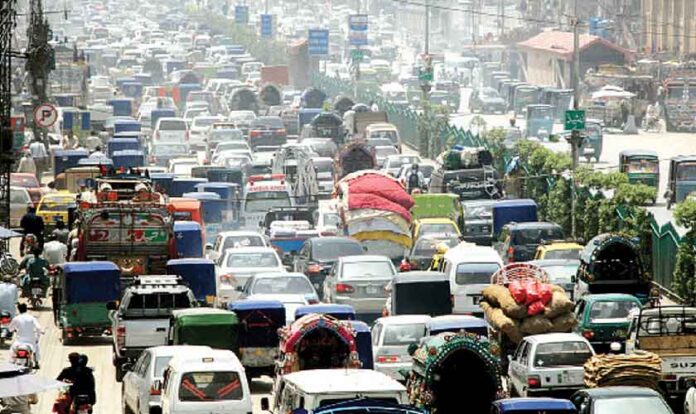PESHAWAR: Khyber Pakhtunkhwa is facing increasing urban pollution, with Peshawar showing consistently poor air quality and pollution-related health issues rising across the province.
Data from the University of Peshawar and health departments point to a sharp increase in respiratory illnesses, while pollution sources remain largely unchecked in key cities.
In Peshawar, PM2.5 concentrations are nearly four times above the National Environmental Quality Standards (NEQS), with average values significantly exceeding the 25 µg/m³ threshold set by the World Health Organization. Transport emissions are the biggest contributor to the city’s air pollution, accounting for 58.5%, followed by roadside dust at 17.7%, domestic burning at 11.7%, industrial emissions at 6.6%, waste burning at 4.1%, and commercial burning at 1.4%.
Between June 2023 and June 2024, KP recorded a notable rise in air- and waterborne illnesses. According to Lady Reading Hospital, over 221,920 kilograms of medical waste were generated annually.
In response, incinerators have been installed at key facilities including Hayatabad Medical Complex, Khyber Teaching Hospital, and Shaukat Khanum Memorial Hospital.
Water pollution is also rising. Officials report significant contamination in the Kabul and Swat rivers due to plastic, sewage, and industrial runoff. This threatens aquatic species such as Mahseer and trout, and also impacts agriculture and human consumption.
To monitor air quality, KP authorities installed the first Internet of Things (IoT)-based air monitoring device at the Peshawar District Government Office. The system tracks temperature, humidity, carbon dioxide, and dust levels in real-time.
Under the Ghari Chandan reforestation initiative, 3.2 million trees have been planted on the outskirts of Peshawar to improve air quality. A ban on plastic bags is now being enforced in Peshawar, Dera Ismail Khan, and Swat, and environmental squads are checking fuel and lubricant quality.
Pakistan sees 138.2 deaths per 100,000 males and 41.3 per 100,000 females due to Chronic Obstructive Pulmonary Disease (COPD). Globally, air pollution causes around 7 million deaths annually, with 3.23 million linked directly to COPD.
Despite multiple actions taken, experts say immediate, large-scale interventions are required. Without stronger enforcement and sustained public awareness, the province risks long-term economic and health damage due to unchecked pollution.




